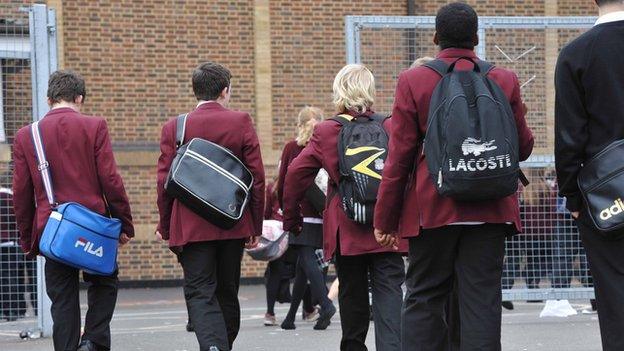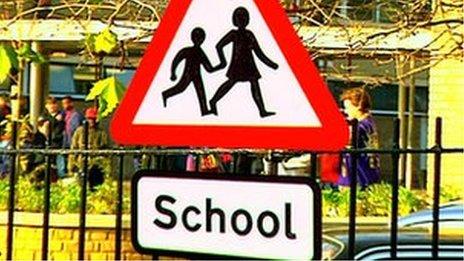'Gap' in school governor records
- Published

School governors are meant to hold schools to account, but governing bodies have come under scrutiny
There is no central record held by the Department for Education of governors of state schools in England.
This is despite heightened scrutiny of the role of school governing bodies following the Trojan Horse inquiries.
Head teachers' leader Russell Hobby said the lack of a register of the identities of governors was a "worrying gap" that would surprise parents.
The Department for Education said it was now considering making all schools publish details of governing bodies.
Governors, who are volunteers such as parents and local community representatives, have an important role in overseeing £46bn of annual school spending, according to a recent study.
'Counter-extremism'
The Trojan Horse inquiries in Birmingham examined allegations that schools were being taken over by groups promoting a hard-line Muslim agenda.
In particular there were concerns about governing bodies and whether some governors had exerted an inappropriate influence.
Education Secretary Nicky Morgan last month said she had toughened up the Department for Education's expertise in "counter-extremism", including by "dramatically expanding" its due diligence processes.
But there are no centralised records of the identities of governors currently in post.
And David Simmonds, chairman of the Local Government Association's children and young people board, said the Trojan Horse problems showed there was a need for a "high degree of transparency" over who was on governing bodies.
There needed to be sufficient oversight to protect against people with "ill intentions" from joining, he said.
And he warned that without oversight or records beyond individual schools it was difficult to see patterns of whether individuals had become governors in a number of different places.
"Most parents will be surprised to learn that the Department for Education doesn't keep a central record of people serving as school governors," said Mr Hobby, leader of the National Association of Head Teachers.
"Governors are an essential part of running a good school, but in a small number of cases they can exert an unwelcome influence on the way schools are run.
"We saw this happen in Birmingham, and over a year later the negative impact of the so called Trojan Horse plot is still being felt."
Mr Hobby said that after three separate reports into the Trojan Horse claims there still appeared to be "gaps in the department's knowledge".
Governor training
But there are arguments that having such a central database of an estimated 350,000 people who are serving as governors would not improve oversight - and that this depends on more focused scrutiny of specific local problems.
The Public Accounts Committee also recently highlighted concerns that oversight of schools was now more complex, with responsibility for many schools resting with academy chains rather than local authorities.
The National Governors Association has suggested that a more worrying gap is the lack of mandatory training for governors.
A spokesman for the Department for Education said the "vast majority" already published the names of governors on their own individual websites - but that there were plans under consideration to go further.
"Good governance is more vital than ever, which is why we have revised the governors' handbook so that schools place more emphasis on training and identifying potential skills gaps," said the spokesman.
"As part of our commitment to transparency, we advise all schools to publish a full list of their governors on their websites - and the vast majority already do.
"Academies are required to provide this information in their annual accounts, and we are consulting on placing a similar requirement on all maintained schools."
- Published13 January 2014

- Published30 January 2015

- Published15 May 2014
